
Cảnh báo qua mail cùng với check_mk cũng là một cách. Nhưng có nhiều người lại thích dùng với telegram. Ở bài này tôi sẽ hướng dẫn các bạn làm sao để có thể nhận cảnh báo của check_mk cùng với telegram
Đây là cảnh báo cùng với telegram. Bạn muốn cảnh báo cả với mail nữa không. Nếu có hãy tham khảo bài viết hướng dẫn cảnh báo check_mk cùng với gmail. Còn ở bài này chúng ta cùng tìm hiểu về cảnh báo qua telegram nhé
I. Tìm ID chat của telegram
1. Tạo bot chat
https://telegram.me/botfather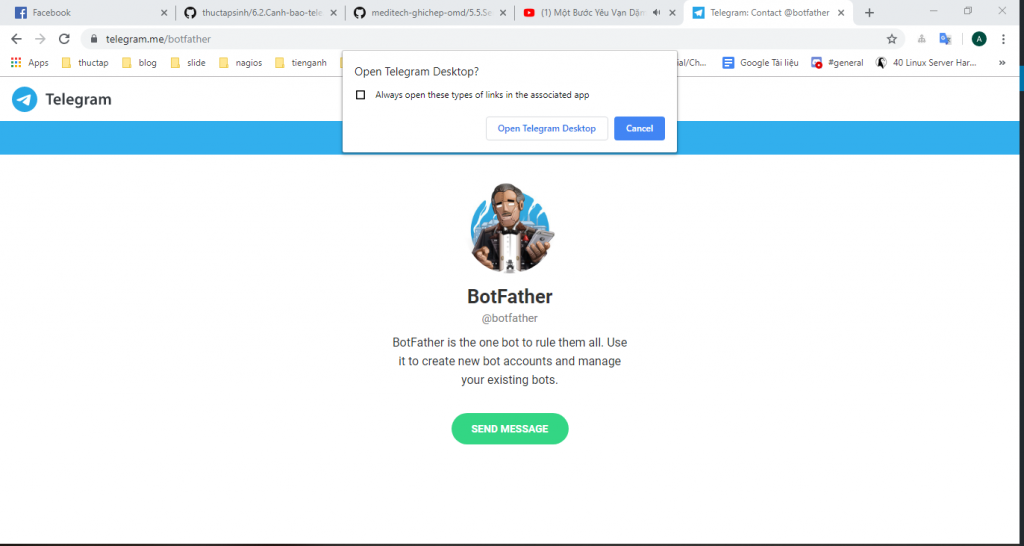
Đây là bot hướng dẫn và tạo một bot theo ý của chúng ta. Chọn newbot để tạo ra bot mới.

2. Mỗi bot đều có tên hãy đặt tên cho nó

3. Tiếp theo ta sẽ phải chọn ra một username cho bot này.

4. Chat với bot


5. Tìm ID chat bằng HTTP API
Cú pháp
https://api.telegram.org/botToken/getUpdatesCác bạn hãy thay token tìm được ở bên trên của mình nhé
https://api.telegram.org/bot908652940:AAGYGskRFhRr42cy4or1FynDMtfKKzTIs6w/getUpdates
II. Cấu hình trên checkmk
1.Tạo ra file telegram.py
vi /omd/sites/monitoring/share/check_mk/notifications/telegram.pyNội dung file telegram.py có cú pháp như sau:
#!/usr/bin/env python
# Telegram V2
# Copyright Mathias Kettner 2013 mk@mathias-kettner.de
# Stefan Gehn 2016 stefan+cmk@srcxbox.net
# check_mk is free software; you can redistribute it and/or modify it
# under the terms of the GNU General Public License as published by
# the Free Software Foundation in version 2. check_mk is distributed
# in the hope that it will be useful, but WITHOUT ANY WARRANTY; with-
# out even the implied warranty of MERCHANTABILITY or FITNESS FOR A
# PARTICULAR PURPOSE. See the GNU General Public License for more de-
# ails. You should have received a copy of the GNU General Public
# License along with GNU Make; see the file COPYING. If not, write
# to the Free Software Foundation, Inc., 51 Franklin St, Fifth Floor,
# Boston, MA 02110-1301 USA.
# Telegram notification based on asciimail notification from
# check_mk 1.2.6p16.
import os
import re
import sys
reload(sys)
sys.setdefaultencoding('utf8')
import urllib
import urllib2
### CHANGE THESE ###
telegram_bot_token = 'TOKEN-HERE'
####################
tmpl_host_text = """*Check_MK: $HOSTNAME$ - $EVENT_TXT$*
```
Host: $HOSTNAME$
Alias: $HOSTALIAS$
Address: $HOSTADDRESS$
Event: $EVENT_TXT$
Output: $HOSTOUTPUT$
$LONGHOSTOUTPUT$```"""
tmpl_service_text = """*Check_MK: $HOSTNAME$/$SERVICEDESC$ $EVENT_TXT$*
```
Host: $HOSTNAME$
Alias: $HOSTALIAS$
Address: $HOSTADDRESS$
Service: $SERVICEDESC$
Event: $EVENT_TXT$
Output: $SERVICEOUTPUT$
$LONGSERVICEOUTPUT$```"""
def substitute_context(template, context):
# First replace all known variables
for varname, value in context.items():
template = template.replace('$'+varname+'$', value)
# Remove the rest of the variables and make them empty
template = re.sub("\$[A-Z_][A-Z_0-9]*\$", "", template)
return template
def construct_message_text(context):
notification_type = context["NOTIFICATIONTYPE"]
if notification_type in [ "PROBLEM", "RECOVERY" ]:
txt_info = "$PREVIOUS@HARDSHORTSTATE$ -> $@SHORTSTATE$"
elif notification_type.startswith("FLAP"):
if "START" in notification_type:
txt_info = "Started Flapping"
else:
txt_info = "Stopped Flapping ($@SHORTSTATE$)"
elif notification_type.startswith("DOWNTIME"):
what = notification_type[8:].title()
txt_info = "Downtime " + what + " ($@SHORTSTATE$)"
elif notification_type == "ACKNOWLEDGEMENT":
txt_info = "Acknowledged ($@SHORTSTATE$)"
elif notification_type == "CUSTOM":
txt_info = "Custom Notification ($@SHORTSTATE$)"
else:
txt_info = notification_type # Should neven happen
txt_info = substitute_context(txt_info.replace("@", context["WHAT"]), context)
context["EVENT_TXT"] = txt_info
if context['WHAT'] == 'HOST':
tmpl_text = tmpl_host_text
else:
tmpl_text = tmpl_service_text
return substitute_context(tmpl_text, context)
def fetch_notification_context():
context = {}
for (var, value) in os.environ.items():
if var.startswith("NOTIFY_"):
context[var[7:]] = value.decode("utf-8")
return context
def send_telegram_message(token, chat_id, text):
url = 'https://api.telegram.org/bot%s/sendMessage' % (token)
data = urllib.urlencode({'chat_id':chat_id, 'text':text, 'parse_mode':'Markdown'})
#print("sending telegram message, url '%s', chat id '%s', text '%s'" % (url, chat_id, text))
try:
urllib2.urlopen(url, data).read()
except urllib2.URLError, e:
sys.stdout.write('Cannot send Telegram message: HTTP-Error %s %s\n' % (e.code, e))
def main():
context = fetch_notification_context()
telegram_chatid = context.get('CONTACT_TELEGRAM_CHAT_ID')
if not telegram_chatid: # e.g. empty field in user database
sys.stdout.write("Cannot send Telegram message: Empty destination chat id")
sys.exit(2)
text = construct_message_text(context)
send_telegram_message(telegram_bot_token, telegram_chatid, text)
main()Bên trên là bản Scrip mẫu. Các bạn hãy thay token của mình vào đó. Ví dụ tôi thay vào sẽ thành.
#!/usr/bin/env python
# Telegram V2
# Copyright Mathias Kettner 2013 mk@mathias-kettner.de
# Stefan Gehn 2016 stefan+cmk@srcxbox.net
# check_mk is free software; you can redistribute it and/or modify it
# under the terms of the GNU General Public License as published by
# the Free Software Foundation in version 2. check_mk is distributed
# in the hope that it will be useful, but WITHOUT ANY WARRANTY; with-
# out even the implied warranty of MERCHANTABILITY or FITNESS FOR A
# PARTICULAR PURPOSE. See the GNU General Public License for more de-
# ails. You should have received a copy of the GNU General Public
# License along with GNU Make; see the file COPYING. If not, write
# to the Free Software Foundation, Inc., 51 Franklin St, Fifth Floor,
# Boston, MA 02110-1301 USA.
# Telegram notification based on asciimail notification from
# check_mk 1.2.6p16.
import os
import re
import sys
reload(sys)
sys.setdefaultencoding('utf8')
import urllib
import urllib2
### CHANGE THESE ###
telegram_bot_token = '908652940:AAGYGskRFhRr42cy4or1FynDMtfKKzTIs6w'
####################
tmpl_host_text = """*Check_MK: $HOSTNAME$ - $EVENT_TXT$*
```
Host: $HOSTNAME$
Alias: $HOSTALIAS$
Address: $HOSTADDRESS$
Event: $EVENT_TXT$
Output: $HOSTOUTPUT$
$LONGHOSTOUTPUT$```"""
tmpl_service_text = """*Check_MK: $HOSTNAME$/$SERVICEDESC$ $EVENT_TXT$*
```
Host: $HOSTNAME$
Alias: $HOSTALIAS$
Address: $HOSTADDRESS$
Service: $SERVICEDESC$
Event: $EVENT_TXT$
Output: $SERVICEOUTPUT$
$LONGSERVICEOUTPUT$```"""
def substitute_context(template, context):
# First replace all known variables
for varname, value in context.items():
template = template.replace('$'+varname+'$', value)
# Remove the rest of the variables and make them empty
template = re.sub("\$[A-Z_][A-Z_0-9]*\$", "", template)
return template
def construct_message_text(context):
notification_type = context["NOTIFICATIONTYPE"]
if notification_type in [ "PROBLEM", "RECOVERY" ]:
txt_info = "$PREVIOUS@HARDSHORTSTATE$ -> $@SHORTSTATE$"
elif notification_type.startswith("FLAP"):
if "START" in notification_type:
txt_info = "Started Flapping"
else:
txt_info = "Stopped Flapping ($@SHORTSTATE$)"
elif notification_type.startswith("DOWNTIME"):
what = notification_type[8:].title()
txt_info = "Downtime " + what + " ($@SHORTSTATE$)"
elif notification_type == "ACKNOWLEDGEMENT":
txt_info = "Acknowledged ($@SHORTSTATE$)"
elif notification_type == "CUSTOM":
txt_info = "Custom Notification ($@SHORTSTATE$)"
else:
txt_info = notification_type # Should neven happen
txt_info = substitute_context(txt_info.replace("@", context["WHAT"]), context)
context["EVENT_TXT"] = txt_info
if context['WHAT'] == 'HOST':
tmpl_text = tmpl_host_text
else:
tmpl_text = tmpl_service_text
return substitute_context(tmpl_text, context)
def fetch_notification_context():
context = {}
for (var, value) in os.environ.items():
if var.startswith("NOTIFY_"):
context[var[7:]] = value.decode("utf-8")
return context
def send_telegram_message(token, chat_id, text):
url = 'https://api.telegram.org/bot%s/sendMessage' % (token)
data = urllib.urlencode({'chat_id':chat_id, 'text':text, 'parse_mode':'Markdown'})
#print("sending telegram message, url '%s', chat id '%s', text '%s'" % (url, chat_id, text))
try:
urllib2.urlopen(url, data).read()
except urllib2.URLError, e:
sys.stdout.write('Cannot send Telegram message: HTTP-Error %s %s\n' % (e.code, e))
def main():
context = fetch_notification_context()
telegram_chatid = context.get('CONTACT_TELEGRAM_CHAT_ID')
if not telegram_chatid: # e.g. empty field in user database
sys.stdout.write("Cannot send Telegram message: Empty destination chat id")
sys.exit(2)
text = construct_message_text(context)
send_telegram_message(telegram_bot_token, telegram_chatid, text)
main()Thay TOKEN bằng TOKEN chúng ta lấy được qua chat box @BotFather
2. Cấp quyền cho file telegram.py
chmod +x /omd/sites/monitoring/share/check_mk/notifications/telegram.py3. Restart lại omd server :
omd restart4. Cấu hình trên WATO
Trên WATO các bạn thực hiện các bước bên dưới như mình nhé!
Đâu tiền ta sẽ tạo thêm Attributes User. Sau đó save và cập nhật thay đổi



NOTE : Theo mặc định thì sẽ mỗi user sẽ không có trường ID của telegram. Mặc định nó chỉ có trường Email và Pager nên ta có thể tạo thêm trường tại New attribute
- Show in WATO host table : Hiển thị trực tiếp trong bảng user hay là không
- Editable by Users : Cho phép user thường chỉnh sửa trường đó hay không
- Add to monitoring configuration : Giá trị này có được sử dụng trong cảnh báo hay là không
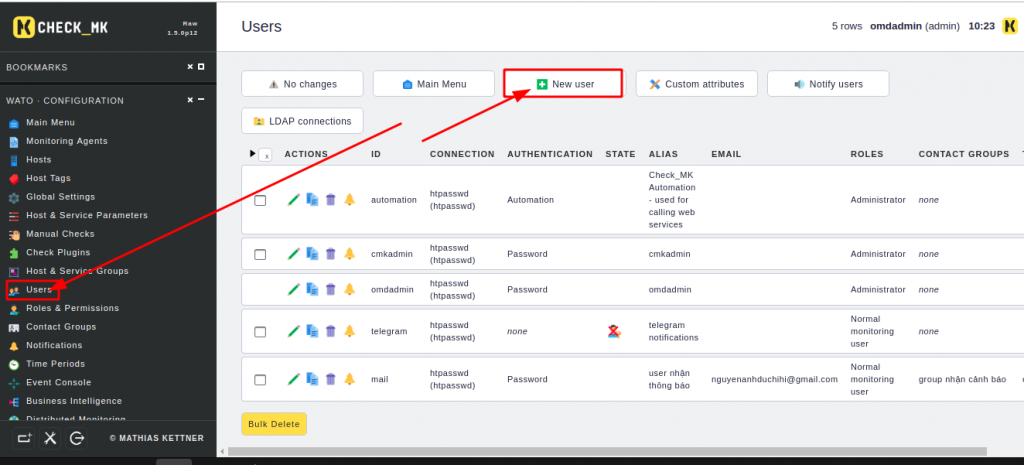
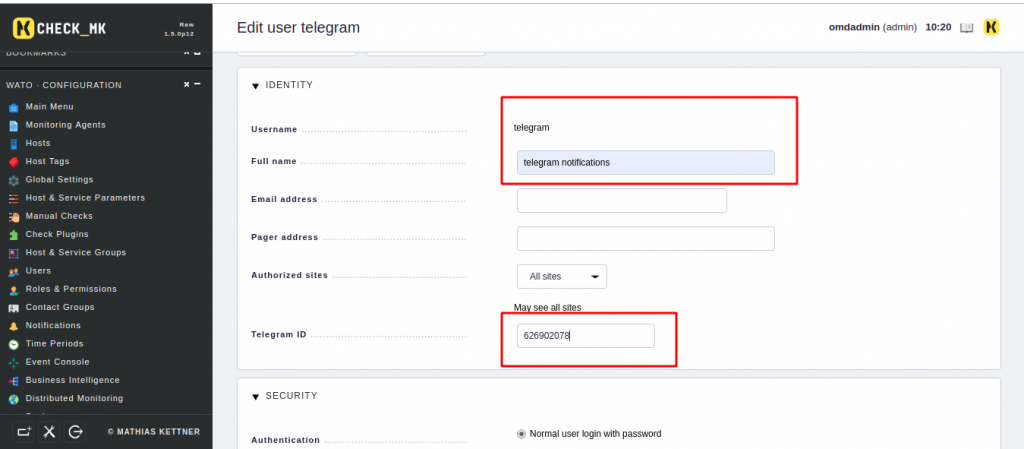
NOTE : Ta có thể cảnh báo vào một bot; một channel; hay là một group trong telegram. Ở trên tôi đã ghi ID của một bot. Vì thế nó sẽ cảnh báo về bot đã được tạo. Để có thể cảnh báo về Group thì ta thay thế ID đó bằng ID của group mà ta muốn.



Sau đó ta Sử dụng HTTP API token để lấy ID của group chat với cú pháp
https://api.telegram.org/bot$token/getUpdates
ví dụ:
https://api.telegram.org/bot908652940:AAGYGskRFhRr42cy4or1FynDMtfKKzTIs6w/getUpdates
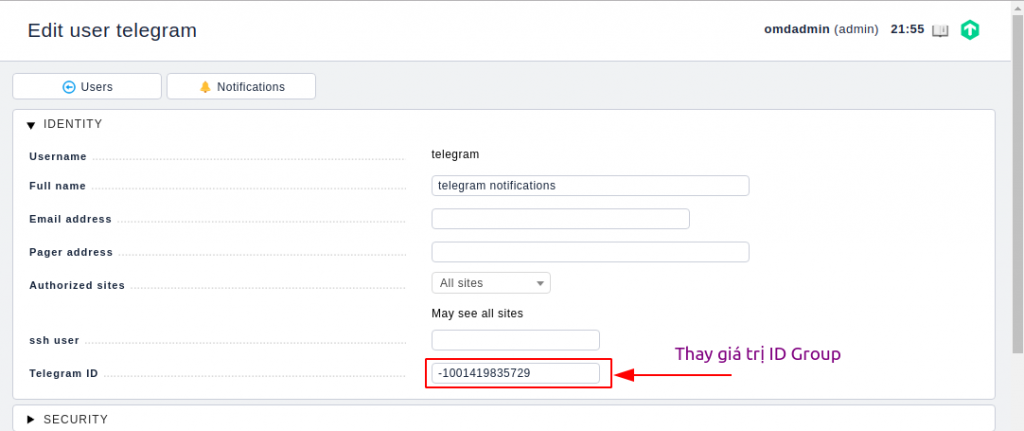
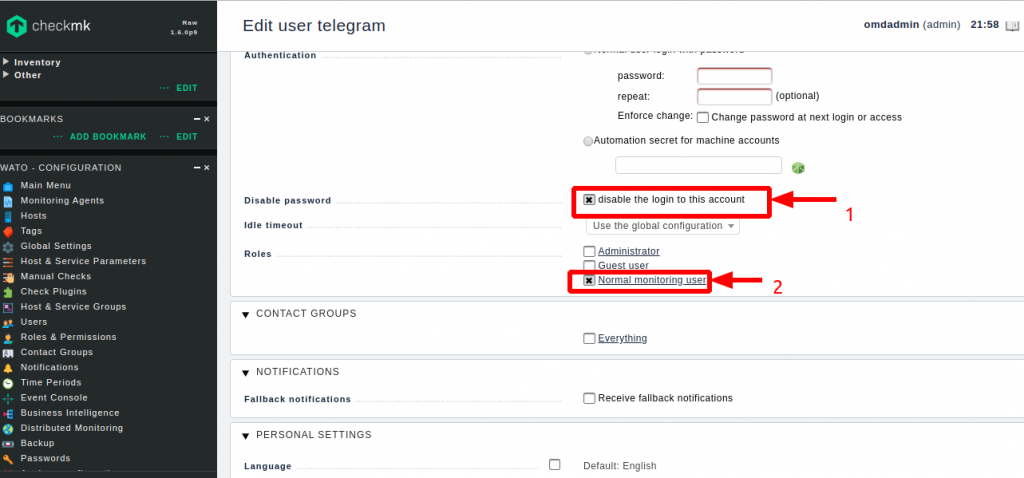
2: xác định đây là một user thường
Sau đó ta tạo ra cảnh báo với telegram



Cuối cùng chúng ta hãy kiểm tra xem bot đã hoạt động chưa bằng cách tắt máy mà chúng ta theo dõi với telegram

Vậy là mọi thứ đã hoạt động bình thường. Đây là một con bot đơn giản bạn nào học ngôn ngữ rồi thì có thể tạo riêng cho mình một con bot khác và chỉ cần làm theo các bước như trên thôi. Cảm ơn các bạn và chúc các bạn thành công!
Leave a Reply